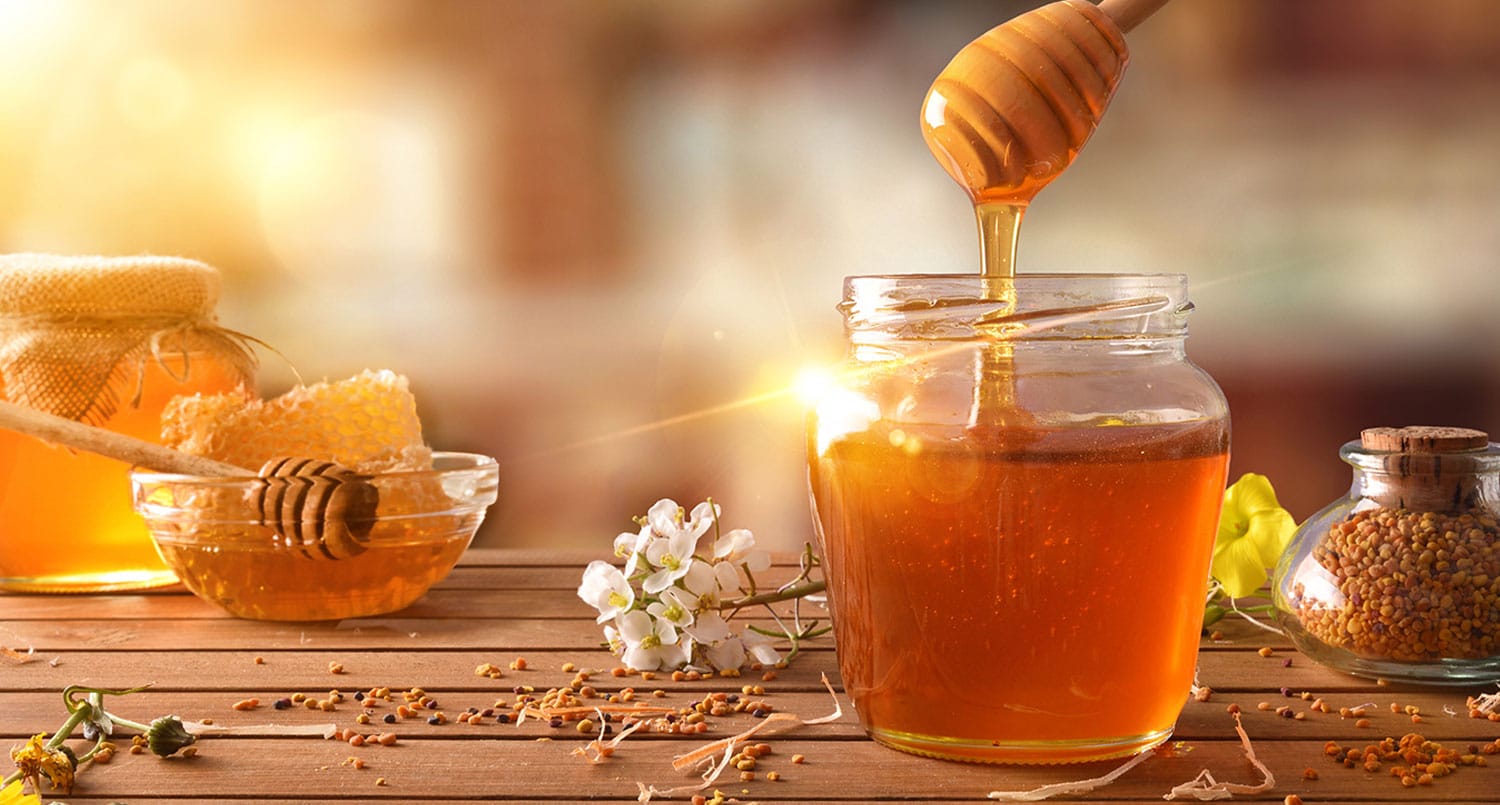- Sapori di Sicilia
- 30056 views
Differences and characteristics between Chestnut Honey, Lemon Honey, Honeydew Honey, Wildflower Honey, Sulla Honey, Eucalyptus Honey, Orange Tree Honey. Choosing the honey that best suits your needs and taste can be difficult. In fact, there are really many varieties of honey available on the market and just as many factors that affect production.
The differences between types of honey depend a lot on the pollen that bees get from plants of flowers. The geographical area, seasonality and altitude are further variables that play a decisive role in honey production.
Before describing the differences between the types of honey, it is necessary to make some premises, starting with pollen. In this regard, it is good to remember that bees do not collect pollen from a single flower but from many plants. All this allows to obtain honeys with varied aromas and fragrances. Just think of Sulla or Lemon Honey.

The available honey s not all the same also in terms of density and color. There are liquid honeys, more or less dense and those with an amber and crystalline appearance. In these cases so much depends on the flower of origin. All the variables described, taken together, inevitably reflect the organoleptic characteristics of the finished product. Some honeys are particularly sweet, others have a bitter aftertaste and this allows you to meet diverse needs in terms of preferences. The various honey have specific properties and this makes them suitable for some subjects and to combat some common diseases, such ad cough, fatigue, circulatory problems and much more.
Here are the distinctions between the main types of honey, considering the best known and appreciated ones.
Chestnut Honey
Derived from natural chestnut woods, Chestnut Honey is characterized by its bitterish taste, particularly intense and pungent. It has a liquid density, given the high content of fructose, as well as a crystallization almost absent and creamy. Chestnut Honey facilitates blood circulation, has astringent properties and urinary disinfectants. Chestnut Honey is a product that is recommended to everyone, that is children, anemics, those who suffer from fatigue and even the elderly. In addition, it goes well with roasts, bruschetta and aged or aromatic cheeses.
Lemon Honey
The single-floral Lemon Honey, composed of simple sugars, is very appreciated not only for ts pleasant scent, but also for its sweet and strong flavor, embellished with acidulous notes. This particular honey, produced with lemon flowers growing in the southern part of Sicily, has a fine crystallization. In addition to be healing for ulcers, it boasts antispasmodic and sedative properties. A valid ally to fight headaches or insomnia, lemon honey is a tonic and a detoxifier for the organism. It is a rich source of vitamins, antioxidants and mineral salts. Thanks to its high content of vitamin C is recommended without distinction to everyone, adults and children. N the kitchen it is recommended to flavor herbal teas, drinks or tea. It also foes well with soft cheese or on a piece of Parmesan cheese.
Honeydew Honey
Honeydew Honey is often and mistakenly confused with honey, but it is a different product. Honeydew Honey is obtained from the sugary substances secreted by small insects that feed on the sap of the leaves, especially firs, pines and oaks. Honeydew has a taste not excessively sweet, but still very pleasant and similar to that of caramel. Rich in iron, vitamins, magnesium and calcium, Honeydew has a slow and creamy crystallization. I has an effective antiseptic and antibacterial action. Often used to supplement mineral salts, it is particularly recommended to athletes, as well as to treat the nervous system and respiratory tract. Suitable for those who follow a vegetarian diet, Honeydew Honey can be accompanied with soft or seasoned cheese or used to flavor yogurt.
Wildflower Honey
This is one of the most popular and beloved honeys, made from different types of flowers and characterized by a sweet and lovable flavor, without any particular aftertaste. Characterized by semi-thick crystals, Wildflower Honey has a very compact consistency that is pleasant to the palate and has a coloration tending to yellow ocher. It has a detoxifying action for the livers and is very versatile in cooking, as it is often used for the preparation of various desserts or to accompany mature and spicy cheeses. Wildflower is also recommended to those who follow a vegetarian diet. This product is suitable for sweetening drinks such as coffee, milk, herbal teas or tea. It is also a perfect ingredient to accompany desserts and seasonal fruit.
Sulla Honey
Less known until recently, Sulla Honey is now always easier to find and it is loved for its interesting characteristics, as well as for its flavor. It is a uni-floral honey, derived form the grass Sulla, leguminous variety present in the southern and central areas of Italy and especially in Sicily. This honey, with a quick crystallization, is recognized for its very delicate taste, with a fruity aftertaste and often citrus. The smell is not particularly intense and the color is clear. Sulla honey has purifying and antioxidant effects. It also has a diuretic and laxative action, as well as being recommended n case of cough and sore throat. Sulla Honey is also the perfect ingredient form many healthy recipes, such as sauces and creams. It is the perfect match for goat’s cheese or ricotta.
Eucalyptus Honey
With an average aroma and caramel flavor, Eucalyptus Honey is characterized by the presence of little refined sugars, thus, proving to be a healthy and natural product, as well as versatile in the kitchen. This honey, with a fine and very compact crystallization, has an antiasmatic and antibiotic action, for this reason it is often recommended to fight cough, as well as to treat the cold and during season changes. In addition, it soothes urinary tract diseases and plays an anti-inflammatory effect on the entire body. The culinary combinations with Eucalyptus Honey are various. The product is suitable not only to sweeten drinks and herbals teas, but also to accompany the tastings of soft cheeses. Eucalyptus Honey will surprise the most demanding palates as it allows to make unusual combinations, especially for aperitifs and delicious appetizers. It is used to enrich salads, vegetables and sauces. It is also excellent with aged cheeses such as Pecorino or Ragusano.




















